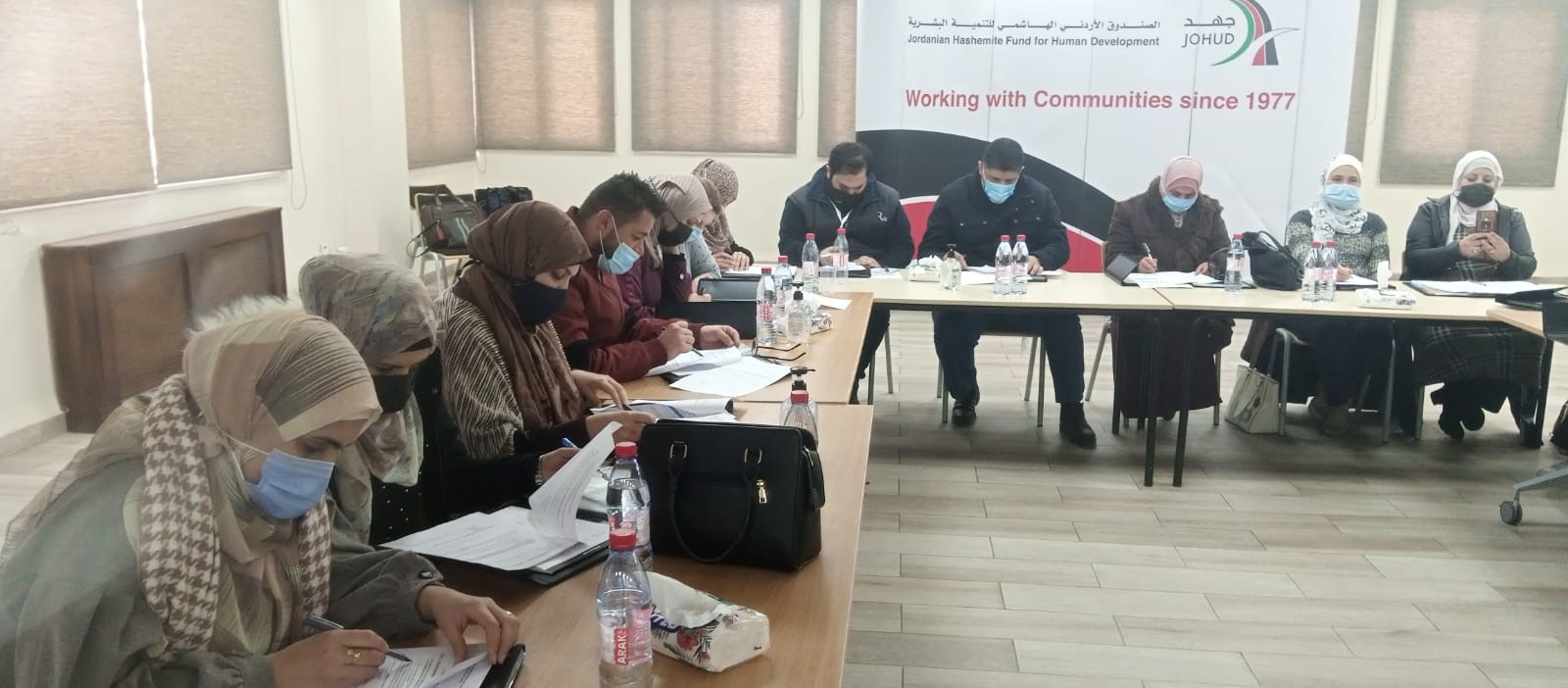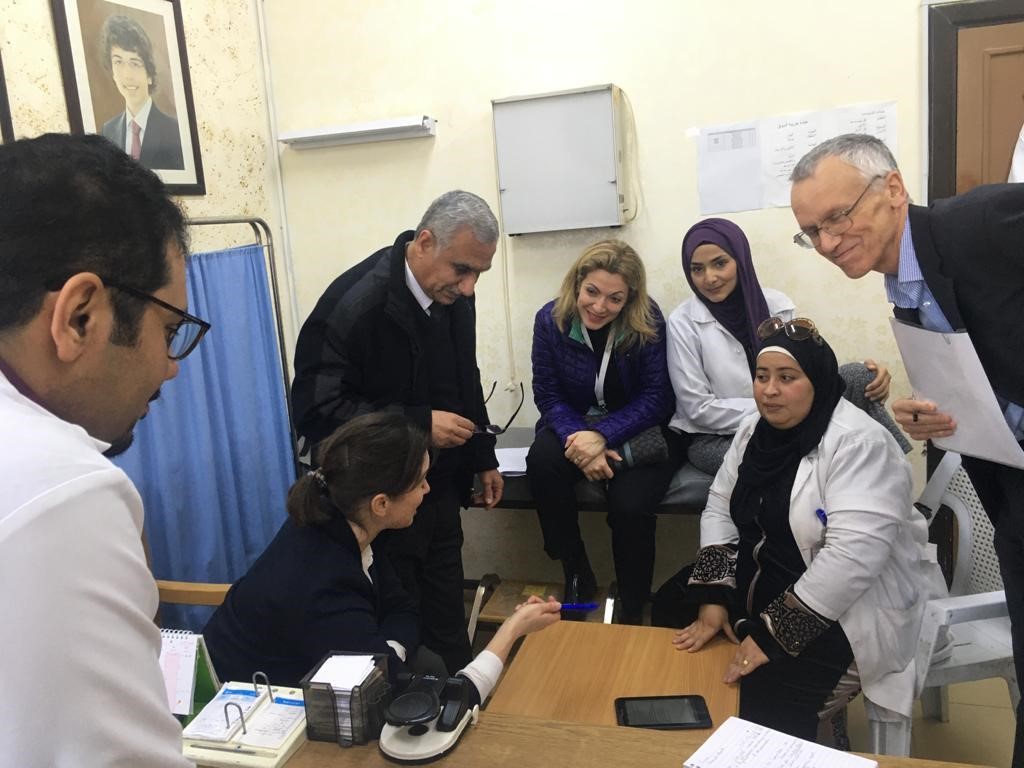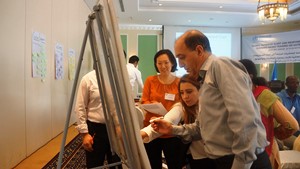Jordan implements WHO HEARTS in primary health care to strengthen management of cardiovascular diseases and related risks
 WHO HEARTS training workshop conducted in Jordan in March 2022. Credit: Dana Darwish, 2022
WHO HEARTS training workshop conducted in Jordan in March 2022. Credit: Dana Darwish, 2022
In Jordan, noncommunicable diseases (NCDs) pose a heavy burden on health as they are responsible for nearly 80% of all deaths. Cardiovascular diseases, one of the main NCDs, cause 42% of these deaths. In 2019, data from Jordan’s national STEPwise survey for NCDs risk factors showed that the prevalence of hypertension (52%), diabetes (20%) and high risk for cardiovascular disease (25%) in adults aged 45–69 years old represented a significant public health priority.
In response, the Ministry of Health, in close collaboration with WHO, launched an initiative to implement the WHO HEARTS technical package to strengthen response to cardiovascular diseases.
WHO HEARTS technical package
This technical package provides a strategic approach to improving cardiovascular health in countries. It supports ministries of health to strengthen cardiovascular disease management in primary health care (PHC) settings through delivery of a comprehensive care package to patients by health facility teams, including doctors, nurses and technicians. This comprehensive care package includes healthy lifestyle counselling, evidence-based treatment protocols, access to medicines and technology, risk-based cardiovascular disease management, team-based care and systems for monitoring.
The WHO HEARTS technical package comprises 6 modules and an implementation guide. The practical, step-by-step modules are supported by an overarching technical document that provides a rationale and framework for this integrated approach to the management of NCDs. The WHO HEARTS technical package is part of the broader Global Hearts Initiative that includes 4 other packages that address the prevention of cardiovascular diseases.
Implementation of WHO HEARTS in Jordan
Implementation of the WHO HEARTS technical package comprised a multi-phase approach to improve access to quality essential health services, which enables countries to strengthen their health systems to deliver on disease-specific service coverage results. First, there was the preparatory (pre-implementation) phase which led to the implementation phase followed by the scaling up phase. Effective implementation of the package has been shown to improve early detection and control of patients with cardiovascular disease risk factors, that is, hypertension, diabetes and high cardiovascular disease risk.
Since 2019, the Ministry of Health, with WHO technical and financial support, took several successful steps towards the implementation of WHO’s HEARTS technical package. These entailed the following pre-implementation activities:
Establishing a steering and a technical committee to oversee the implementation of this package.
Conducting baseline assessments of pilot health care centres to evaluate their readiness to implement WHO HEARTS, exploring the availability of health care workers, equipment, laboratory investigation, medicines, health care services, patient records, and other necessary prerequisites. This assessment was initially conducted in 6 centres; however, it was expanded in 2022 during the implementation phase to more than 100 centres that are implementing the package.
Developing consensus- and evidence-based clinical guidance for the assessment of cardiovascular disease risk and management of hypertension and diabetes at the PHC level, tailored to the local context.
Developing a comprehensive training package based on the WHO HEARTS technical package and locally adapted clinical guidances. The training package is in Arabic and English, and provides details on lifestyle counselling, clinical management of risk factors, team-based care, monitoring of patient outcomes and service delivery.
In 2021, the WHO supported the Ministry in incepting the implementation phase, which involved training 24 trainers comprising 18 physicians and 6 nurses, with the aim of rolling out the training on the implementation of the WHO HEARTS technical package throughout the country. This was followed by a scaling up phase in 2022, in which the ministry expanded its efforts to train all physicians and nurses in health care centres across the country, prospectively to include 1500 health care professionals in 500 centres.
The facility assessments and training uncovered many gaps, which the Ministry, with WHO technical support, is working to effectively address. Interventions involve enhancing task sharing and role distribution among medical team members. Also, amending patient pathways within clinics to optimize early detection of risk factors. Other interventions receiving attention are improving the availability and maintenance of essential equipment, supporting clinical management, monitoring of patients, in addition to strengthening existing patient records and health information systems.
 Facility assessment visit conducted by the Ministry of Health in Jordan, WHO and Primary Care International in November 2019. Credit: Marion Lynch, 2019 Among the key success factors to the implementation of WHO HEARTS is the strong commitment of the Ministry of Health, as well as the continuous monitoring of its implementation at facility and national levels. Hence, WHO supported the Ministry of Health in developing clinical and programme performance monitoring indicators. These will be deployed to periodically assess the impact of the programme on the early detection and management of hypertension, diabetes and cardiovascular disease risk. The results from these assessments will be used to further inform the implementation and scale up of the programme throughout the country.
Facility assessment visit conducted by the Ministry of Health in Jordan, WHO and Primary Care International in November 2019. Credit: Marion Lynch, 2019 Among the key success factors to the implementation of WHO HEARTS is the strong commitment of the Ministry of Health, as well as the continuous monitoring of its implementation at facility and national levels. Hence, WHO supported the Ministry of Health in developing clinical and programme performance monitoring indicators. These will be deployed to periodically assess the impact of the programme on the early detection and management of hypertension, diabetes and cardiovascular disease risk. The results from these assessments will be used to further inform the implementation and scale up of the programme throughout the country.
One of the main outcomes opted for in this initiative is the better integration of NCDs into PHC services, hence, a wider coverage of the population living with NCDs, which will support progress towards universal health coverage.
A key factor to success of the initiative is the political will towards its implementation guided by continuous monitoring through assessments, which enable making informed recommendations to address gaps and their root causes.
Vacancy notice: Human Resources Officer
The WHO country office in Jordan is announcing the following position:
Human Resources Officer, Amman, Jordan
Interested candidates are kindly requested and strongly encouraged to apply online. You may do this through:
• Career portal (WHO staff/internal)
• Career portal (external candidates)
The system provides instructions for online application procedures.
Interested candidates are kindly requested to observe the closure date and time outlined on the requisition at the time they access it through Stellis. This deadline, set by the system, reflects your personal device system setting. Applications received after the closure of the requisition are not accepted.
NB: For assessment of your application, please ensure that: 1) Your profile is properly completed and updated; 2) All required details regarding your qualifications, education and training are provided; 3) Your experience records are entered with elaboration on tasks performed at the time. Kindly note that CVs/PHFs inserted via LinkedIn are not accessible.
Global Outbreak Alert and Response Network (GOARN) scenario-based training on outbreak response
 GOARN is a collaboration of existing institutions and networks, constantly alert and ready to respond. The network pools human and technical resources for rapid identification, confirmation and response to outbreaks of international importance. 25–29 October 2016, Dead Sea, Jordan – The Global Outbreak Alert and Response Network (GOARN) is a global technical partnership, coordinated by WHO. For several years, GOARN has provided expertise and technical resources globally for field investigation of and response to public health emergencies.
GOARN is a collaboration of existing institutions and networks, constantly alert and ready to respond. The network pools human and technical resources for rapid identification, confirmation and response to outbreaks of international importance. 25–29 October 2016, Dead Sea, Jordan – The Global Outbreak Alert and Response Network (GOARN) is a global technical partnership, coordinated by WHO. For several years, GOARN has provided expertise and technical resources globally for field investigation of and response to public health emergencies.








